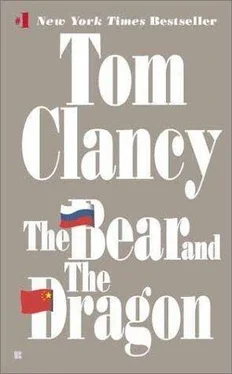Tom Clancy - The Bear and the Dragon
Здесь есть возможность читать онлайн «Tom Clancy - The Bear and the Dragon» весь текст электронной книги совершенно бесплатно (целиком полную версию без сокращений). В некоторых случаях можно слушать аудио, скачать через торрент в формате fb2 и присутствует краткое содержание. Год выпуска: 2001, ISBN: 2001, Жанр: Триллер, на английском языке. Описание произведения, (предисловие) а так же отзывы посетителей доступны на портале библиотеки ЛибКат.
- Название:The Bear and the Dragon
- Автор:
- Жанр:
- Год:2001
- ISBN:780425180969
- Рейтинг книги:3 / 5. Голосов: 1
-
Избранное:Добавить в избранное
- Отзывы:
-
Ваша оценка:
- 60
- 1
- 2
- 3
- 4
- 5
The Bear and the Dragon: краткое содержание, описание и аннотация
Предлагаем к чтению аннотацию, описание, краткое содержание или предисловие (зависит от того, что написал сам автор книги «The Bear and the Dragon»). Если вы не нашли необходимую информацию о книге — напишите в комментариях, мы постараемся отыскать её.
The Bear and the Dragon — читать онлайн бесплатно полную книгу (весь текст) целиком
Ниже представлен текст книги, разбитый по страницам. Система сохранения места последней прочитанной страницы, позволяет с удобством читать онлайн бесплатно книгу «The Bear and the Dragon», без необходимости каждый раз заново искать на чём Вы остановились. Поставьте закладку, и сможете в любой момент перейти на страницу, на которой закончили чтение.
Интервал:
Закладка:
“Well, Diggs is sending Apaches down to escort the raiding force. That’ll be an equalizer,” Moore promised. “What about the command bunker?”
“It’s centrally located, looks pretty secure, entirely underground, but we have a rough idea of the configuration from penetrating radar.” Foley referred to the KH-14 Lacrosse satellite. NASA had once published radar photos that had shown underground tributaries of the Nile that emptied into the Mediterranean Sea at Alexandria. But the capability hadn’t been developed for hydrologists. It had also spotted Soviet missile silos that the Russians had thought to be well camouflaged, and other sensitive facilities, and America had wanted to let the Russians know that the locations were not the least bit secret. “Mickey, how do you feel about the mission?”
“I wish we had enough bombs to do it,” General Moore replied honestly.
“Yeah,” the DCI agreed.
The Politburo meeting had gone past midnight.
“So, Marshal Luo,” Qian said, “things went badly yesterday. How badly? We need the truth here,” he concluded roughly. If nothing else, Qian Kun had made his name in the past few days, as the only Politburo member with the courage to take on the ruling clique, expressing openly the misgivings that they’d all felt. Depending on who won, it could mean his downfall, either all the way to death or simply to mere obscurity, but it seemed he didn’t care. That made him unusual among the men in the room, Fang Gan thought, and it made him a man to be respected.
“There was a major battle yesterday between 34th Shock Army and the Russians. It appears to have been a draw, and we are now maneuvering to press our advantage,” the Defense Minister told them. They were all suffering from fatigue in the room, and again the Finance Minister was the only one to rise to his words.
“In other words, a battle was fought, and we lost it,” Qian shot back.
“I didn’t say that!” Luo responded angrily.
“But it is the truth, is it not?” Qian pressed the point.
“I told you the truth, Qian!” was the thundering reply.
“Comrade Marshal,” the Finance Minister said in a reasonable tone, “you must forgive me for my skepticism. You see, much of what you’ve said in this room has turned out to be less than completely accurate. Now, I do not blame you for this. Perhaps you have been misinformed by some of your subordinates. All of us are vulnerable to that, are we not? But now is the time for a careful examination of objective realities. I am developing the impression that objective reality may be adverse to the economic and political objectives on whose pursuit this body has sent our country and its people. Therefore, we must now know what the facts are, and what also are the dangers facing us. So, Comrade Marshal, now, what is the military situation in Siberia?”
“It has changed somewhat,” Luo admitted. “Not entirely to our benefit, but the situation is by no means lost.” He’d chosen his words a little too carefully.
By no means lost, everyone around the table knew, was a delicate way of saying that a disaster had taken place. As in any society, if you knew the aphorisms, you could break the code. Success here was always proclaimed in the most positive terms. Setbacks were brushed aside without admission as something less than a stunning success. Failure was something to be blamed on individuals who’d failed in their duty-often to their great misfortune. But a real policy disaster was invariably explained as a situation that could yet be restored.
“Comrades, we still have our strengths,” Zhang told them all. “Of all the great powers of the world, only we have intercontinental missiles, and no one will dare strike us hard while we do.”
“Comrade, two days ago the Americans totally destroyed bridges so stout that one would have thought that only an angry deity could so much as scratch them. How secure can those missiles be, when we face a foe with invisible aircraft and magical weapons?” Qian asked. “I think we may be approaching the time when Shen might wish to approach America and Russia to propose an end to hostilities,” he concluded.
“You mean surrender?” Zhang asked angrily. “Never!”
It had already started, though the Politburo members didn’t know it yet. All over China, but especially in Beijing, people owning computers had logged onto the Internet. This was especially true of young people, and university students most of all.
The CIA feed, http://www.darkstarfeed.cia.gov/siberia-battle/realtime.ram, had attracted a global audience, catching even the international news organizations by surprise. CNN, Fox, and Europe’s SkyNews had immediately pirated it, and then called in their expert commentators to explain things to their viewers in the first continuous news coverage of an event since February of 1991. CIA had taken to pirating CNN in turn, and now available on the CIA website were live interviews from Chinese prisoners. They spoke freely, they were so shocked at their fates-stunned at how near they’d come to death, and so buoyantly elated at their equally amazing survival when so many of their colleagues had been less fortunate. That made for great verbosity, and it was also something that couldn’t be faked. Any Chinese citizen could have spotted false propaganda, but equally, any could discern this sort of truth from what he saw and heard.
The strange part was that Luo hadn’t commented on the Internet phenomenon, thinking it irrelevant to the political facts of life in the PRC, but in that decision he’d made the greatest political misapprehension of his life.
They met in college dorm rooms first of all, amid clouds of cigarette smoke, chattering animatedly among themselves as students do, and like students everywhere they combined idealism with passion. That passion soon turned to resolve. By midnight, they were meeting in larger groups. Some leaders emerged, and, being leaders, they felt the need to take their associates somewhere. When the crowds mingled outside, the individual leaders of smaller groups met and started talking, and super-leaders emerged, rather like an instant military or political hierarchy, absorbing other groups into their own, until there were six principal leaders of a group of about fifteen hundred students. The larger group developed and then fed upon its own energy. Students everywhere are well supplied with piss and vinegar, and these Chinese students were no different. Some of the boys were there hoping to score with girls-another universal motivation for students-but the unifying factor here was rage at what had happened to their soldiers and their country, and even more rage at the lies that had gone out over State TV, lies so clearly and utterly refuted by the reality they saw over the Internet, a source they’d learned to trust.
There was only one place for them to go, Tiananmen Square, the “Square of Heavenly Peace,” the psychological center of their country, and they were drawn there like iron filings to a magnet. The time of day worked for them. The police in Beijing, like police everywhere, worked twenty-four-hour days divided into three unequal shifts, and the shift most lightly manned was that from 2300 to 0700. Most people were asleep then, and as a direct result there was little crime to suppress, and so this shift was the smallest in terms of manning, and also composed of those officers loved the least by their commanders, because no man in his right mind prefers the vampire life of wakefulness in darkness to that in the light of day. And so the few police on duty were those who had failed to distinguish themselves in their professional skills, or were disliked by their captains, and returned the compliment by not taking their duties with sufficient gravity.
Читать дальшеИнтервал:
Закладка:
Похожие книги на «The Bear and the Dragon»
Представляем Вашему вниманию похожие книги на «The Bear and the Dragon» списком для выбора. Мы отобрали схожую по названию и смыслу литературу в надежде предоставить читателям больше вариантов отыскать новые, интересные, ещё непрочитанные произведения.
Обсуждение, отзывы о книге «The Bear and the Dragon» и просто собственные мнения читателей. Оставьте ваши комментарии, напишите, что Вы думаете о произведении, его смысле или главных героях. Укажите что конкретно понравилось, а что нет, и почему Вы так считаете.






![Александр Ирвин - Tom Clancy’s The Division 2. Фальшивый рассвет [litres]](/books/417744/aleksandr-irvin-tom-clancy-s-the-division-2-falsh-thumb.webp)




